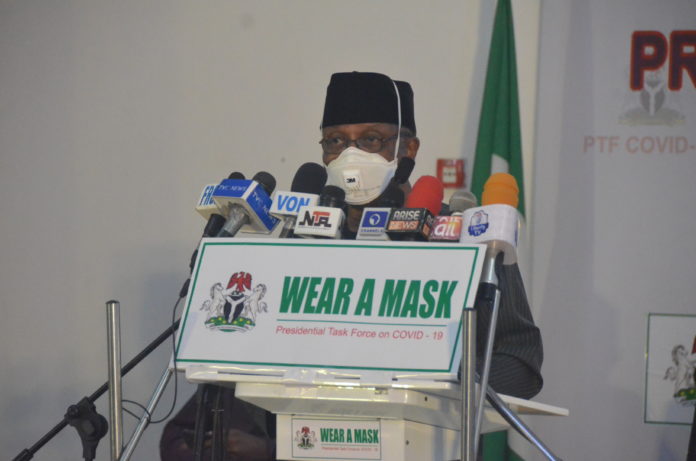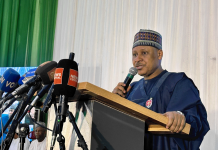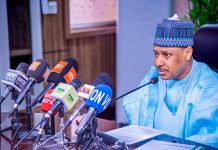PROTOCOL
My briefing today begins with greetings and best wishes to our healthcare workers for their service and sacrifice and the hope that we now substantially adhere to advisories on how to keep ourselves safe from random and nosocomial COVID-19 infection, so as not to continuously diminish available manpower for response. The work of healthcare workers begins with helping to drive risk communication & community engagement by joining the campaigns against crowding, and for observance of hand hygiene, respiratory etiquette and use of face masks in public places. I started with this because health manpower and compliance with non-pharmaceutical measures will, with time, become the most important part of our strategy, and success will increasingly depend on a strong public/government partnership to make it work. In this respect, we shall also continue to engage our traditional, community, religious and business leaders to mobilize support for citizen sensitization and mobilization.
2. The core response strategy of the Federal Ministry of Health is still based on trace, test, isolate and treat, which, as at this morning, has yielded 389 new single-day cases, for a total of 8,733 confirmed cases of COVID-19 in 34 states and FCT, of which 2,501 have been successfully treated and discharged. We have sadly recorded 254 deaths, most of them persons associated with other ailments; whereas, most of those discharged had no co-morbidities, confirming the general observation that risks are higher for those with illnesses such as hypertension, diabetes and non- communicable diseases. 49,966 tests have been done so far, 1422 in one day. It is too early to generalize about mortality trend or even rates of recoveries and discharge, as compared to new cases, but it is time enough to advise that all persons who have, or may be suspected to be hypertensive, diabetic, had treatment for kidney or liver disease, cancer, HIV, TB or even those 60 years and above, are more vulnerable and need to better protect themselves or be protected. We also know that coronavirus infection has less serious effect on younger people, except they have ailments mentioned above. The responsibility for protecting ourselves and each other is therefore with all of us, hence the urgency for use of masks outside our homes and for social distancing. It is especially important where we have gatherings, like in markets.
3. We are, not surprisingly, worried about the increasing number of covid-19 confirmed cases; first because every life matters, but also because of the capacity of our health system to cope. Nigeria presently has over 112 treatment and isolation centres in the 35 states and FCT with over 5,000 beds, but not all States have made it up to at least 300 beds prescribed for isolation and treatment. I had the privilege of commissioning one such center yesterday, a re-purposed hospital in Benin City, Edo State, with 300 beds, including ICU and an Edo State owned PCR testing laboratory. We need to continue increasing bed capacity to match the probable number of patients, so that we do not experience horrific scenes of bed space shortages seen in some European hospitals.
4. In event of overflow, we can require hotels and school dormitories to be prepared for level 1 (Quarantine) and level 2 Isolation (of COVID-19 positive with zero or mild symptoms), to free hospital beds to be dedicated to level 3, (moderate to severe cases) and level 4, (high dependency and Intensive care unit). I therefore call on activists and philanthropists to work with State governments in concerted steps to scale up non-pharmaceutical measures and beef up infrastrucural assets for isolation and treatment in their states.
5. Though we are in the community transmission phase of response, easing social restrictions is desirable, but only if we can meet up with expectations that will not allow a spike in infection rates. This is what has led certain countries to reintroduce lockdowns. We are reviewing health sector specific advisories on re-opening the economy.
6.Global efforts to find a cure for COVID-19, in which Nigeria is participating in the WHO solidarity trial, will be reviewed by our panel of experts, as WHO suspended the trial, due to alarm raised by a Medical journal, on the safety of some drugs being tried, like hydroxychloroquine, chloroquine and their combinations.
7. Proposals for trial of local remedies for the disease have been sent to the relevant research and testing agencies for scientific evaluation. The Madagascar herbs have been received at the Ministry of Health, and were found to consist of two varieties; one labeled to be for prevention and the other for treatment. Samples have been given to 3 Agencies of the Min. of Health and also to Ministry of Science & Technology. These are normal processes for new preparations to be approved for use in Nigeria, and include toxicological and efficacy tests and clinical trials. Government will investigate all genuine efforts to find home grown solutions to the pandemic.
8. Preliminary reports from the ministerial scoping missions to Kano, Katsina, Bornu, Sokoto, Cross River, Gombe allow cautious optimism, especially with regard to Kano and Bornu and also suggest that the support of experienced Federal teams has a strong stabilizating effect on State efforts. Final reports are due soon. Such an operational team will depart to Cross River State as soon as details are worked out, while a mission to Kogi will follow suit next week, as discussed with H.E. the Governor.
9. Until a cure or vaccine is found, prevention is still the best approach to controlling community spread of the virus. We must strengthen the social measures that compensate for the risks to be expected if and when restrictions are further lifted.
10. Thank you for your attention.






